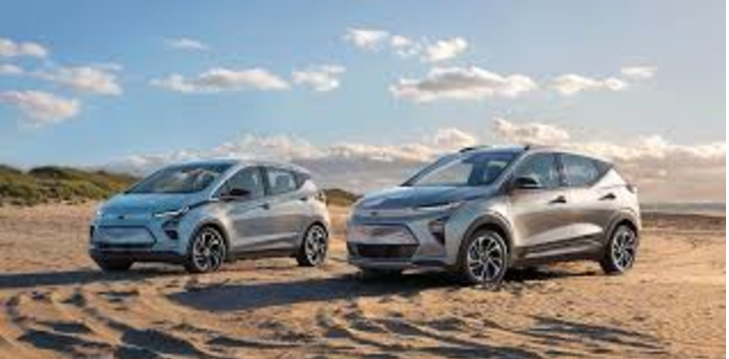Electric vehicles (EVs) are taking the automotive world by storm, with manufacturers constantly innovating to meet the growing demand for eco-friendly cars. Among these, Chevrolet’s Bolt EV and Bolt EUV stand out as two strong contenders in the compact electric vehicle market. While they share a nameplate and many features, they also cater to slightly different audiences. So, how do these two vehicles stack up against each other? Let’s dive into the details of the Bolt EV vs EUV showdown to discover which option is the right fit for you.
Introduction to the Bolt EV and Bolt EUV
As the world continues to shift toward electric transportation, Chevrolet introduced two distinct models to capture the attention of eco-conscious drivers: the Bolt EV, a compact hatchback, and the slightly larger Bolt EUV, a crossover-style SUV. Both vehicles offer an all-electric driving experience and a similar core design, but subtle differences between them could sway buyers one way or another.
When comparing the Bolt EV vs EUV, it’s crucial to consider factors like performance, size, price, interior features, and available technology. These two vehicles represent Chevrolet’s commitment to sustainable mobility while catering to different needs, making it an exciting challenge for anyone deciding between the two.
The Key Differences Between Bolt EV and Bolt EUV
When it comes to deciding between the Bolt EV vs EUV, the most obvious difference lies in their size. The Bolt EUV (Electric Utility Vehicle) is a larger variant of the Bolt EV, offering more room for passengers and cargo. This makes it a great option for families or those who prioritize space. The Bolt EV, on the other hand, excels in its compact design, making it more suitable for urban driving and tight parking spaces.
1. Performance and Driving Range
Performance is always a key consideration when choosing an electric vehicle. Both the Bolt EV and Bolt EUV are powered by the same electric motor, producing 200 horsepower and 266 lb-ft of torque. This makes both models equally competent in terms of acceleration and power delivery. However, the slightly smaller size and lower weight of the Bolt EV give it a minor advantage in efficiency.
- Bolt EV Range: The Bolt EV boasts an EPA-estimated range of 259 miles on a single charge.
- Bolt EUV Range: The Bolt EUV offers a slightly lower range of 247 miles due to its larger size and weight.
While the difference in range is minimal, for drivers who prioritize maximizing distance between charges, the Bolt EV comes out ahead.
Interior and Comfort: Bolt EV vs EUV
In terms of interior space, the Bolt EV vs EUV debate leans in favor of the EUV for those seeking more room. The Bolt EUV is roughly 6 inches longer than the Bolt EV, and this translates to more rear legroom and a larger overall cabin space. Families and passengers who often travel with more gear will likely appreciate the EUV’s additional roominess.
2. Interior Space and Cargo
- Bolt EV Interior: The Bolt EV offers a more compact cabin, with 16.6 cubic feet of cargo space behind the rear seats and a total of 57 cubic feet with the seats folded down. The seating is comfortable but feels more snug, especially for taller passengers in the rear.
- Bolt EUV Interior: The Bolt EUV provides 39.1 inches of rear legroom (compared to the Bolt EV’s 36 inches) and up to 56.9 cubic feet of total cargo space. The rear seats offer a more spacious experience, making it a better choice for longer trips or larger families.
Comfort-wise, both models offer well-designed, supportive seats, but the extra space in the EUV can make a significant difference for backseat passengers.
Technology and Infotainment Features
Chevrolet ensures that both the Bolt EV and EUV are packed with the latest technology, catering to drivers who expect modern conveniences in their electric vehicles. Both models come standard with a 10.2-inch touchscreen, wireless Apple CarPlay, and Android Auto integration, as well as a Wi-Fi hotspot and an available wireless charging pad.
3. Super Cruise Availability
A major difference in the Bolt EV vs EUV comparison is the availability of General Motors’ Super Cruise technology. Super Cruise is a hands-free driving assistance system that uses advanced mapping and sensors to allow for semi-autonomous driving on select highways.
- Bolt EV: Unfortunately, Super Cruise is not available on the Bolt EV.
- Bolt EUV: The Bolt EUV offers Super Cruise as an optional feature, making it one of the most affordable vehicles on the market with this advanced technology.
This availability of Super Cruise could be a deciding factor for those who prioritize the latest in autonomous driving tech.
Price and Value: Bolt EV vs EUV
Price is always a determining factor in the car-buying process, and the Bolt EV vs EUV showdown sees a slight difference here as well. The Bolt EV starts at a lower price point compared to the Bolt EUV, making it the more affordable option for budget-conscious buyers.
4. Price Comparison
- Bolt EV Starting Price: The 2023 Chevrolet Bolt EV starts at approximately $27,000, making it one of the most affordable electric vehicles on the market.
- Bolt EUV Starting Price: The Bolt EUV starts slightly higher, with a base price around $28,500. The increase reflects the added size and available features like Super Cruise.
For buyers weighing cost against features, the Bolt EV might be the better option if budget constraints are more pressing. However, those willing to spend a bit more for additional space and technology may prefer the EUV.
Safety Features and Ratings
Safety is a top priority for Chevrolet, and both the Bolt EV and EUV come equipped with a suite of standard and optional safety features. Chevrolet includes several advanced driver-assistance systems (ADAS) as standard in both models, ensuring that drivers and passengers feel secure on the road.
5. Standard Safety Features
Both the Bolt EV and EUV come equipped with a set of standard safety features, including:
- Automatic Emergency Braking
- Lane Keep Assist with Lane Departure Warning
- Forward Collision Alert
- Front Pedestrian Braking
These systems help prevent collisions and keep drivers aware of their surroundings. For those looking for even more advanced safety options, the Bolt EUV offers additional features such as Adaptive Cruise Control.
Which Should You Choose? Bolt EV vs EUV
The choice between the Bolt EV vs EUV largely comes down to individual priorities. If you’re looking for a budget-friendly, compact EV for city driving with a slightly longer range, the Bolt EV is an excellent choice. It’s nimble, efficient, and packed with tech features that make everyday driving a breeze.
On the other hand, if you need a bit more room for passengers and cargo, or if you’re excited about the possibility of hands-free driving with Super Cruise, the Bolt EUV offers more space and advanced technology. Its crossover design makes it more versatile for families or individuals who need the extra interior volume without sacrificing the benefits of an electric vehicle.
For many, the extra cost of the EUV may be justified by the added space and features, but for others, the compact and slightly more affordable Bolt EV might be the ideal solution. Both vehicles, however, represent a bold step forward in the world of electric cars, offering sustainable and stylish alternatives to traditional gas-powered vehicles.
FAQs
What is the main difference between the Bolt EV and EUV?
The main difference between the Bolt EV and EUV is their size. The EUV is larger, offering more passenger and cargo space, while the EV is more compact and slightly more efficient.
Does the Bolt EUV offer hands-free driving?
Yes, the Bolt EUV offers GM’s Super Cruise technology, a semi-autonomous hands-free driving system, as an optional feature.
Which has a better driving range, Bolt EV or Bolt EUV?
The Bolt EV has a slightly better range of 259 miles compared to the EUV’s 247 miles due to its smaller size and weight.
Is the Bolt EUV worth the extra cost?
If you prioritize more space, advanced technology, and features like Super Cruise, the extra cost of the Bolt EUV can be worth it. For those on a tighter budget, the Bolt EV may offer better value.
Which vehicle is better for families?
The Bolt EUV, with its larger interior and additional rear legroom, is better suited for families or those needing extra cargo space.
Is the Bolt EV cheaper than the EUV?
Yes, the Bolt EV has a lower starting price compared to the Bolt EUV, making it the more affordable option of the two.
Conclusion
In the debate between Bolt EV vs EUV, there is no clear winner – only the right choice for your specific needs. Whether you prioritize budget, range, space, or cutting-edge technology, both models offer compelling reasons to go electric. The Bolt EV impresses with its compact efficiency, while the EUV shines with added space and advanced features like Super Cruise. Whichever you choose, both vehicles symbolize the future








